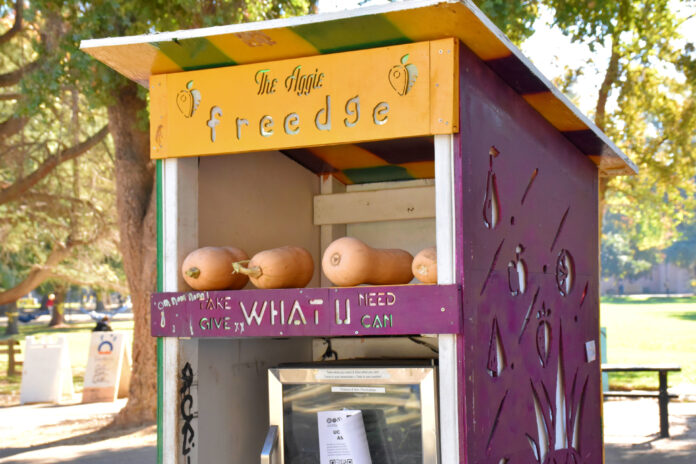Despite popularity, the measure did not pass due to insufficient voter turnout
By LILY FREEMAN – campus@theaggie.org
The Green Initiative Fund (TGIF) fee referendum failed to earn renewal in the ASUCD fall 2022 elections due to insufficient voter turnout, according to the ASUCD elections website. The site outlines that though 79.85% of voters were in favor of the measure, only 5.58% of UC Davis’ undergraduate population participated in the election. A 20% voter turnout is required for any measure on student fees to pass.
TGIF, which has been active on campus since 2016, works to promote sustainable development and environmental innovation by providing financial resources to sustainable organizations and projects run by UC Davis undergraduate students, according to its mission statement. The TGIF site offers examples of previously-granted projects that focus on reducing food insecurity and food waste, promoting climate and environmental justice and introducing composting infrastructure and sustainable agriculture.
TGIF Grant Program Manager Madison Suoja explained what the program has been able to accomplish on campus.
“[TGIF] benefits all students [at UC Davis], whether it be through being a part of the committee, applying for a grant or benefitting from the projects happening on campus,” Suoja said. “In our lifetime, we have funded just about 112 projects and funded about $880,000 [for them].”
TGIF relies on undergraduate student fees to operate. If the fall 2022 election TGIF measure had passed, it would’ve meant reinstating the TGIF fee at $3.50 per quarter per student, effective fall 2023 through spring 2033, with a $0.50 per-quarter increase annually, according to the ballot language of the proposed bill.
According to Suoja, a similar TGIF referendum was held in the 2021-2022 ASUCD election cycle but also failed to pass due to a voter turnout of only about 7%.
“All of this and last academic year, we haven’t been collecting any student fees,” Suoja said. “We have been running our program fully on reserved funds that we have left over from previous years, so this referendum was and is very important to the future of TGIF.”
Olya Egorov, a fourth-year political science – public service major and president of the Zero Waste and Sustainability Club, said that TGIF’s financial support has been greatly impactful to the club.
“They have given us grants for our projects [and] they have given us significant funding for our workshops,” Egorov said. “We rely on TGIF, and I know that many other environmental clubs do too, [so] the immediate impact is that we no longer have funds for our club and for the bigger projects that are significant to students.”
Hanna Wang, a fourth-year environmental science and management major and the co-president of the UCD Environmental Club, agreed.
“We used [the TGIF] grants to fund a free trip for students to attend the California Academy of Sciences in San Francisco,” Wang said. “It was the largest event we had hosted, [and] the grant covered the costs of tickets and food for over 40 students. The club has relied on the grant to make our largest events possible, so now we need to find other sources of funding with TGIF no longer available.”
Suoja detailed several other undergraduate research projects funded by TGIF, such as the Arboretum Floating Islands and the CoHo Rooftop Garden.
“The floating islands in the Arboretum [were] a project where students built plastic islands that float in the Arboretum [and hold] plants in the mesh with roots going into the water to measure the nitrate content of the Arboretum Waterway,” Suoja said. “This was to see if floating islands could be a solution to the unhealthy water and ecosystem that is the Arboretum.”
The CoHo Rooftop Garden is a developing project.
“So far, [we’ve] built a bunch of structures on top of the CoHo to grow fruits and vegetables,” Suoja said. “These will be used in production to supply fresh produce to the CoHo, and any surplus will be given to The Pantry and Aggie Compass.”
ASUCD President Radhika Gawde commented on the TGIF measure in relation to voter turnout, saying that she was “incredibly disappointed” that TGIF failed to pass.
“I think ASUCD has struggled with turnout following COVID-19,” Gawde said. “We are making elections administration more streamlined and effective. We’re also instituting more cohesive and broad marketing strategies to ensure that students are aware of how many services ASUCD provides […] and how their vote matters for these services and beyond. We remain optimistic that spring election turnout will reflect the impact of our new marketing and communication efforts.”
Suoja explained how the program is planning for the future now that a second renewal measure has failed.
“We don’t want TGIF to end,” Suoja said. “There is an option to be on the ballot again, either the spring or the fall, but given the voter-turnout rates, we’re not confident that that is a viable route for us. We’re going to be having conversations with the university, ASUCD and the Sustainability Office about the different routes we can try to take to reinstate the TGIF fee.”
Suoja concluded with her thoughts on the insufficient voter turnout in relation to the impact that TGIF aimed to have.
“TGIF did a lot of things in our power to try and spread the word,” Suoja said. “Our program requires a very small fee that makes a very big difference on campus, [and] while it is important to have a 20% voter turnout, there needs to be more efforts to make sure that at least 20% of the students are voting; otherwise, what is the point of having elections at all?”
Written by: Lily Freeman — campus@theaggie.org











